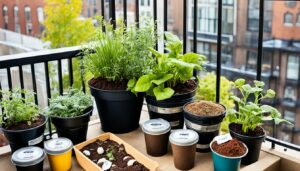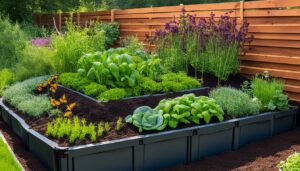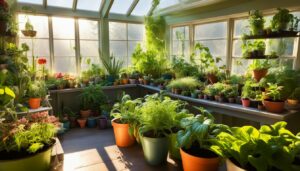Remember the first time your fingers delved into the earth, the cool soil sifting through your hands as you planted a tiny seed, a seed that would soon spring to life? This is the wonder of gardening that, when shared with children, opens up a world teeming with vibrant colors and endless curiosities. Gardening for kids is not just about the soil, the water, and the sun; it is about igniting a spark within young minds and hearts, a spark that grows into a lifelong flame of love for nature. Through fun garden activities for kids and educational gardening projects, little ones can embark on a journey that nurtures their spirit of inquiry and marvel at the cycle of life. It’s a form of play where every scoop of earth and every seed planted is an adventure, a lesson, and a story waiting to blossom.
Inviting children into the garden opens up a canvas for them to paint their imaginations upon. From the creative DIY tool caddies suggested by The Farm Girl Gabs to the delightful charm of I Love Painted Rocks’ Kawaii Ladybug Painted Rocks, we weave whimsy and learning into one beautiful tapestry. With options like planting an edible flower garden to excite their taste buds, or beginning with manageable indoor gardens from Ginger Casa, beginner gardening for children is as thrilling as it is rewarding.
Key Takeaways
- Engage young minds with hands-on, fun garden activities for kids that foster an early love for horticulture.
- Provide kids with their own tools and projects like DIY tool caddies to instill a sense of ownership and responsibility.
- Incorporate creative projects like painted rocks and edible flower gardens to blend education with sensory pleasure.
- Begin with indoor gardening projects that allow children to learn about plant life cycles in an enjoyable, hands-on manner.
- Choose starter activities that are approachable for children, ensuring a positive and educational experience from the start.
Introducing Children to the Joy of Gardening
Embarking on outdoor activities for kids in the garden opens a world of enchantment and education, where every seed planted is a lesson learned and every flower bloomed sparks curiosity. Children’s gardening projects not only cultivate plants; they nurture young minds, teaching them the invaluable lessons of responsibility and the joy that stems from seeing their efforts come to life.
Allowing children to have their own section in the family garden – their very own green domain – fosters a sense of independence. These little patches become fertile grounds for family gardening, where life skills and knowledge about the environment are sown alongside seasonal vegetables and vibrant flowers.
| Plant Variety | Features | Child-Friendly Benefit |
|---|---|---|
| Sunflowers | Large seeds, grow tall | Visual gratification, easy to plant |
| Peas | Grow quickly, can be eaten raw | Teach patience, reward care with a tasty treat |
| Pumpkins | Grow into a large fruit from a small seed | Shows transformation, offers post-harvest carving fun |
| Herbs | Distinctive aromas, useful in cooking | Engage senses, inspire culinary exploration |
Gardening with your family need not be confined to the multitude of green outdoors; it can thrive indoors too. An aromatic herb garden perched on the window sill brings greenery to the kitchen and teaches children the continuity of plant life into our nutrition.
Whether it is a dive into the earthiness of soil or the sweet victory of harvesting their first carrot, gardening with your family is a cluster of moment by moment experiences that tend to stick for a lifetime. They say the family that gardens together, grows together, and indeed, these shared moments are as ripe with bonding as they are with harvest.
So let’s pick up a trowel and some seeds and set forth on an adventure in your garden. It’s time to craft memories in the soil and hearts alike – one plant, one child, one family at a time.
Gardening for Kids, Children’s Gardening Projects, Family Gardening
Embarking on educational gardening projects for kids offers a treasure trove of opportunities, engaging young minds in fun garden activities for kids that foster imagination, responsibility, and a connection with the natural world. As we delve into the world of gardening for kids, we find that it’s a perfect marriage of play and education—a chance for families to grow together.
Designing a Personal Plant Paradise: Kid-Centric Garden Spaces
Imagine a little oasis where children rule—a space tailored for tiny hands and hearts to dig, plant, and nurture. By creating a dedicated kid’s garden, we empower the young ones to take ownership and delight in watching their efforts blossom. These personalized plots are an empowering tool, making children’s gardening projects not just a lesson, but a lifelong passion.
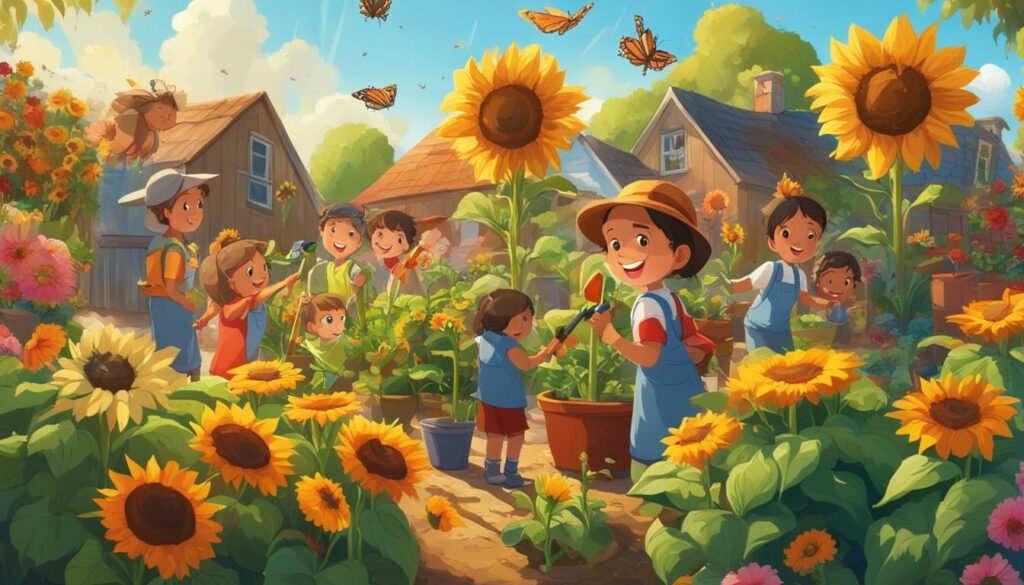
In the center of these imaginative spaces, kids can grow their favorite vegetables or flowers, learning about the cycles of life firsthand. A garden is a vibrant classroom where every task, be it watering or weeding, blends responsibility with the rhythms of nature.
Crafting with Nature: DIY Garden Decor from Recycled Materials
Tapping into a child’s innate creativity, garden decor crafted from recycled materials becomes more than an art project—it’s a lesson in sustainability and resourcefulness. Families can transform old cans into planters or repurpose boots as delightful flower pots, instilling the importance of reusing and repurposing with every brushstroke.
Interactive Learning: Incorporating STEM in the Garden
Gardens are rife with learning moments that organically introduce children to STEM concepts. As they engage in fun garden activities for kids, they also absorb scientific lessons through observing plant growth, understanding the importance of soil quality, and the intricacies of garden ecosystems.
| Activity | Skills Developed | STEM Concepts |
|---|---|---|
| Planting Seeds | Responsibility, Patience | Life Cycles, Botany |
| Decor from Recycled Items | Creativity, Sustainability | Environmental Science, Resource Management |
| Soil Testing | Observation, Analysis | Chemistry, Earth Science |
Thus, educational gardening projects for kids are a canvas for experimentation and discovery. They appeal to all senses, making the garden a true haven for curious minds. Future generations will not only recognize their basil from their chives but also carry forward invaluable tools into adulthood: a love for nature, a penchant for sustainability, and a grounded understanding of the sciences. The seeds we sow today shape the caretakers of tomorrow’s earth.
The Educational Roots of Gardening for Children’s Health
The time-honored tradition of gardening for children’s health is blossoming into a cornerstone of childhood enrichment, blending educational gardening projects for kids with the warmth of family gardening. Incorporating gardening with your family is more than a leisure activity; it’s a robust classroom without walls, where children are the eager students of nature’s curriculum. Engaging in gardening activities helps in developing fine motor skills, understanding ecological relationships, and inculcating preferences for a variety of fruits and vegetables. Below is an insightful table that showcases the benefits and educational aspects of gardening that contribute to children’s holistic development.
| Activity | Physical Benefits | Educational Gains | Emotional Growth |
|---|---|---|---|
| Digging and Planting | Enhances gross motor skills and physical strength | Teaches about plant biology and life cycles | Builds patience and responsibility |
| Weeding and Watering | Encourages regular physical activity | Instills an understanding of plant care and necessity of water | Promotes nurturing behavior and empathy towards living things |
| Harvesting Produce | Improves hand-eye coordination | Introduces concepts of sustainable living and food sources | Offers a sense of accomplishment and boosts self-esteem |
As children dig their hands into the soil, not only do they gain a tangible connection with the earth, but they also absorb essential nutrients through their engagement with dirt, which can contribute positively to their immune system. Moreover, the family garden emerges as a dynamic venue for imparting wisdom about gardening for children’s health, embedding valuable life lessons within every seed sown and every sprout that breaks through the ground.
Gardening can influence children’s dietary habits, too—a critical aspect of cultivating a healthy lifestyle. Vegetables harvested from their labor are more likely to make their way onto their plates, helping establish nutritious eating patterns early on. This hands-on exposure to fresh produce is a practical lesson in nutrition that transcends textbook learning and bears fruit in the form of lifelong healthy habits.
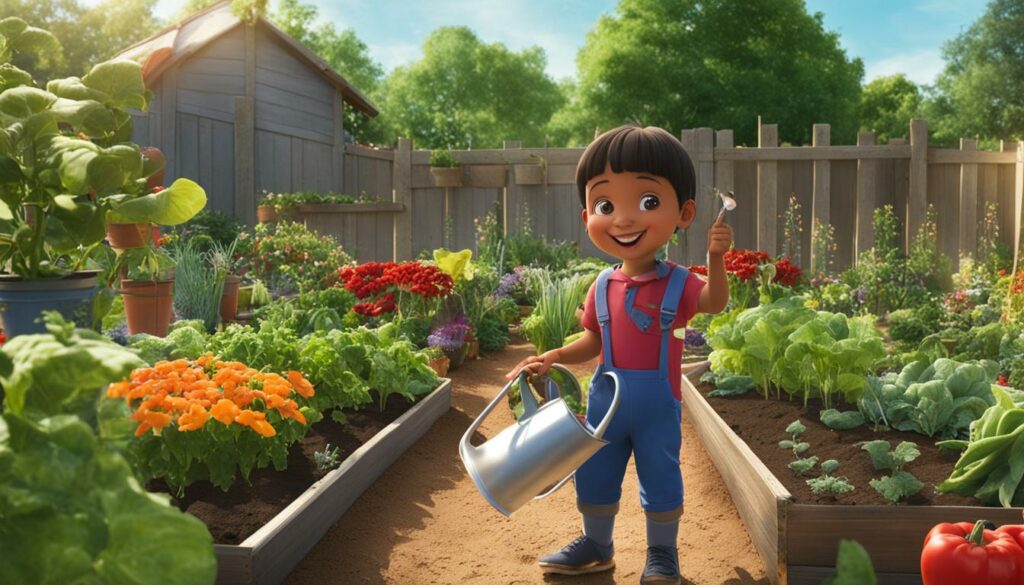
Furthermore, the garden setting serves as a backdrop to teach environmental stewardship and respect for nature. As they learn the importance of biodiversity and the impact of their actions on the ecosystem, children develop into conscientious caretakers of the planet. Therefore, family gardening not only nurtures the body but also the mind and soul, yielding harvests well beyond the garden’s borders.
Conclusion
Gardening for kids is more than a pastime—it’s an interactive gallery through which a tapestry of life lessons is woven. Venturing through the cycles of growth with our children, we lay down roots of curiosity and nurture seeds of stewardship in the rich soil of experiential learning. Beginner gardening for children is a doorway to an evergreen world, where each leaf turned and each bud bloomed spells a narrative of discovery, shaping young minds in their formative years.
Nurturing Nature: Fostering an Environment of Growth and Curiosity
In the verdant classroom of the outdoors, children’s gardening projects transform into pallets of imagination and innovation. Family gardening is deeply enriching, providing fertile ground for both individual and collective creativity. It propels a cycle of learning that spirals from the simple act of planting a seed to the intricate processes that lead to a thriving garden. This journey betrays a profound truth—the natural world is the greatest educator, and within its domain, an unending reservoir of lessons awaits eager, young gardeners.
Harvesting Memories: Reflecting on Special Moments in the Garden
Within each gardening activity lies the potential for a cherished memory. Building, planting, and harvesting become shared narratives in the family’s storybook, contributing chapters filled with sun-kissed faces and muddy fingers. Beginner gardening for children is ripe with precious moments that, when reflected upon, reveal the significant impact of nurturing life in all its forms. Indeed, the garden is both a vault of verdure and a treasure chest of time that, when opened, spills forth moments we carry forward in life, forever reminding us of the natural joy found in the simple act of growing together.



